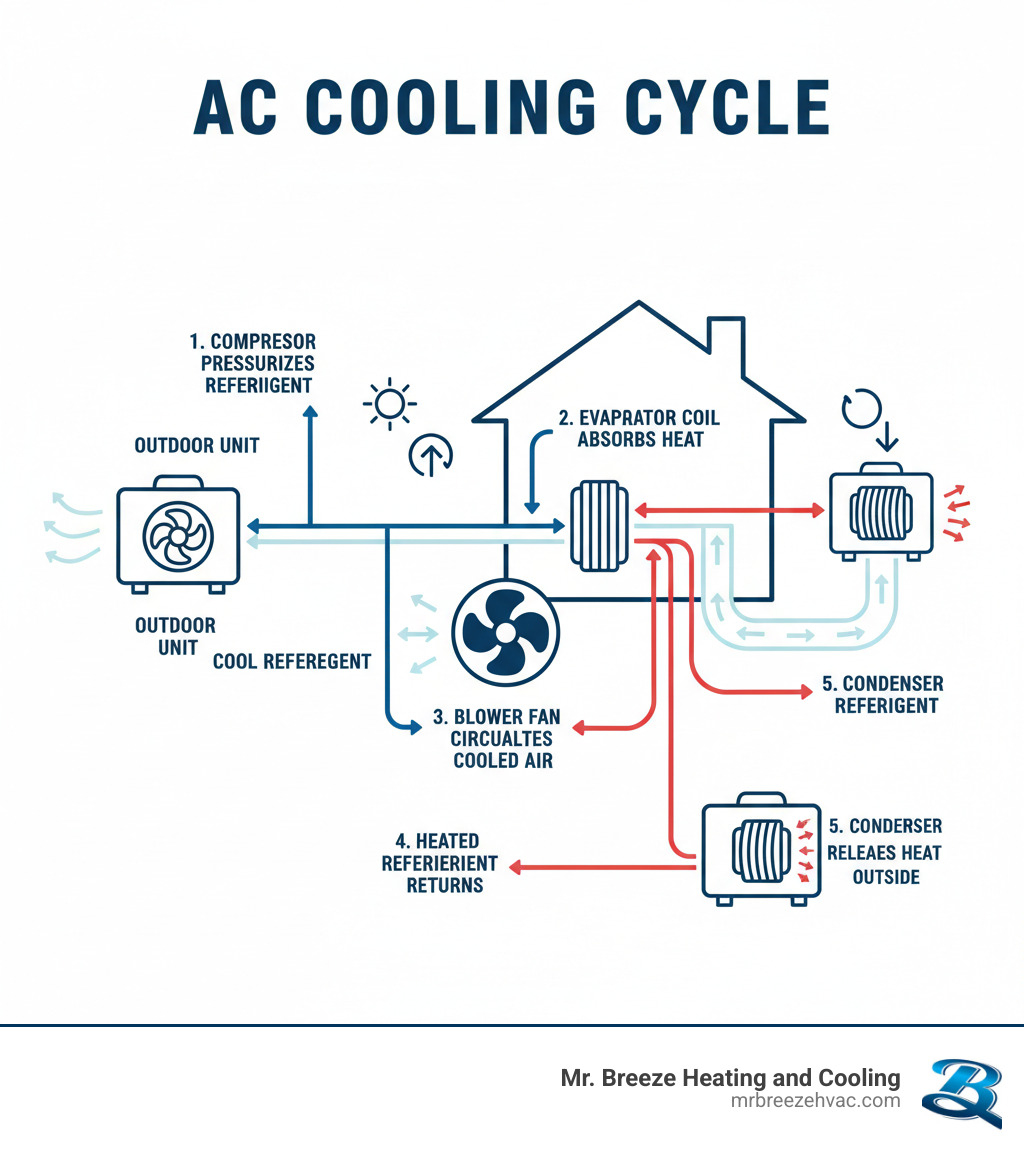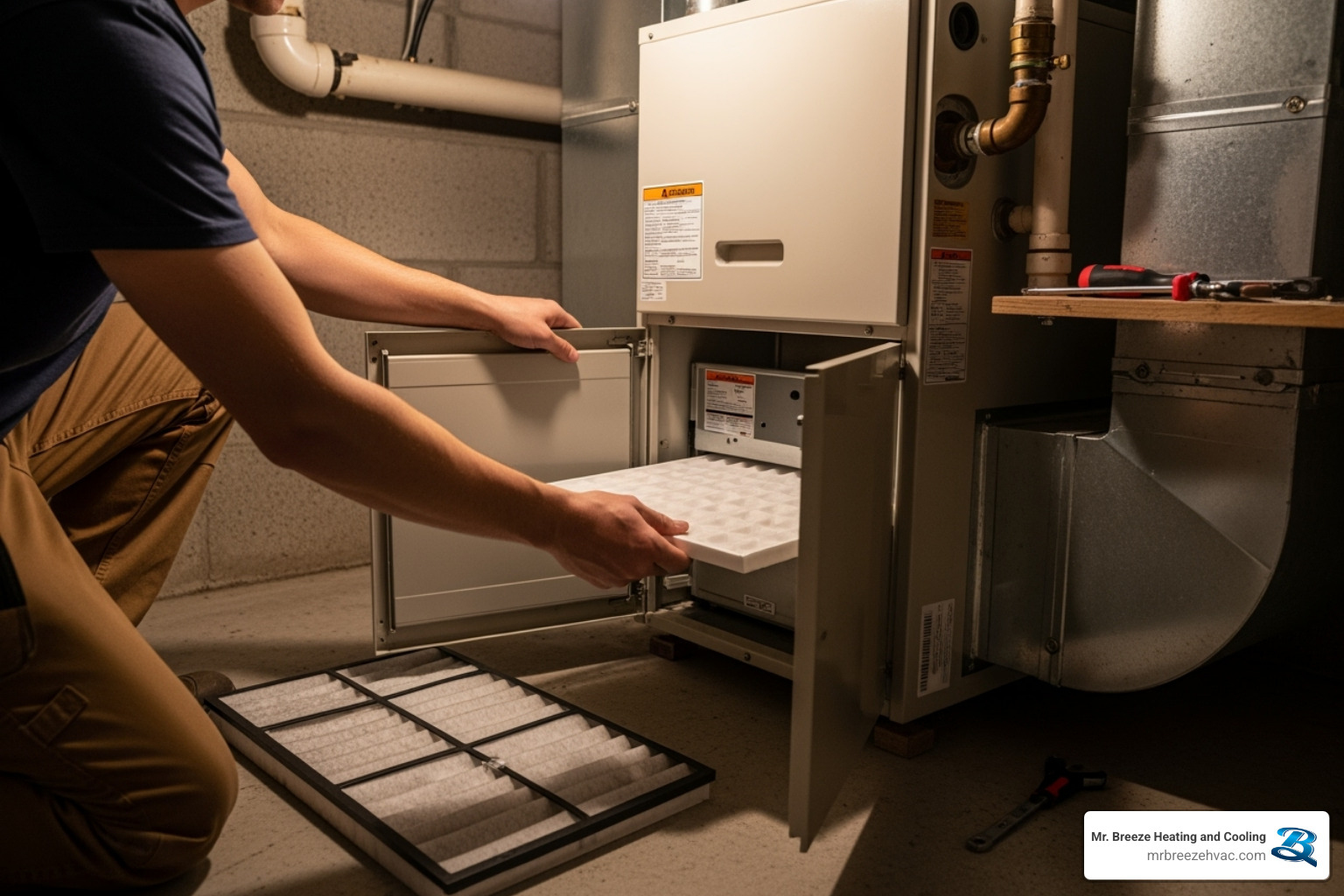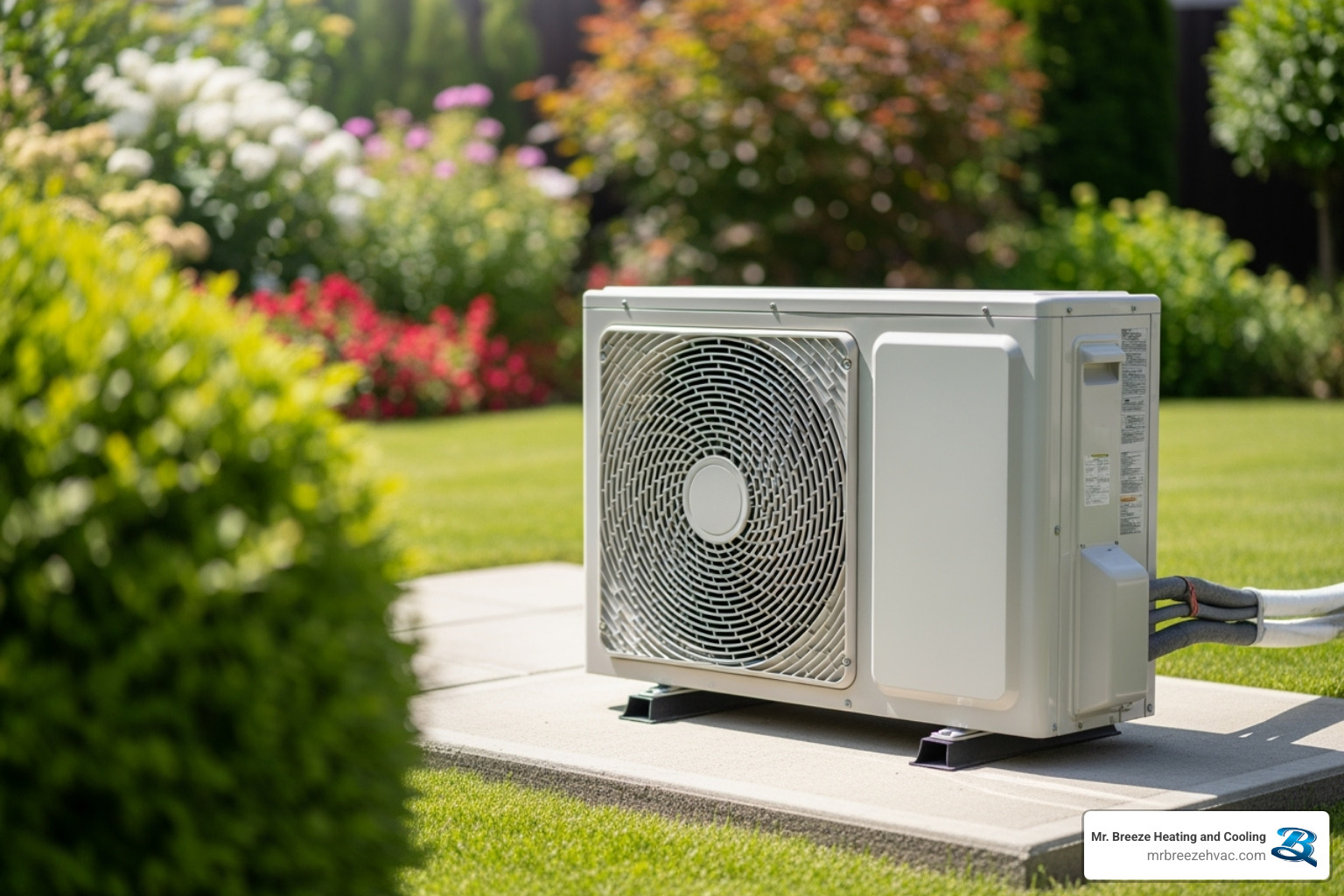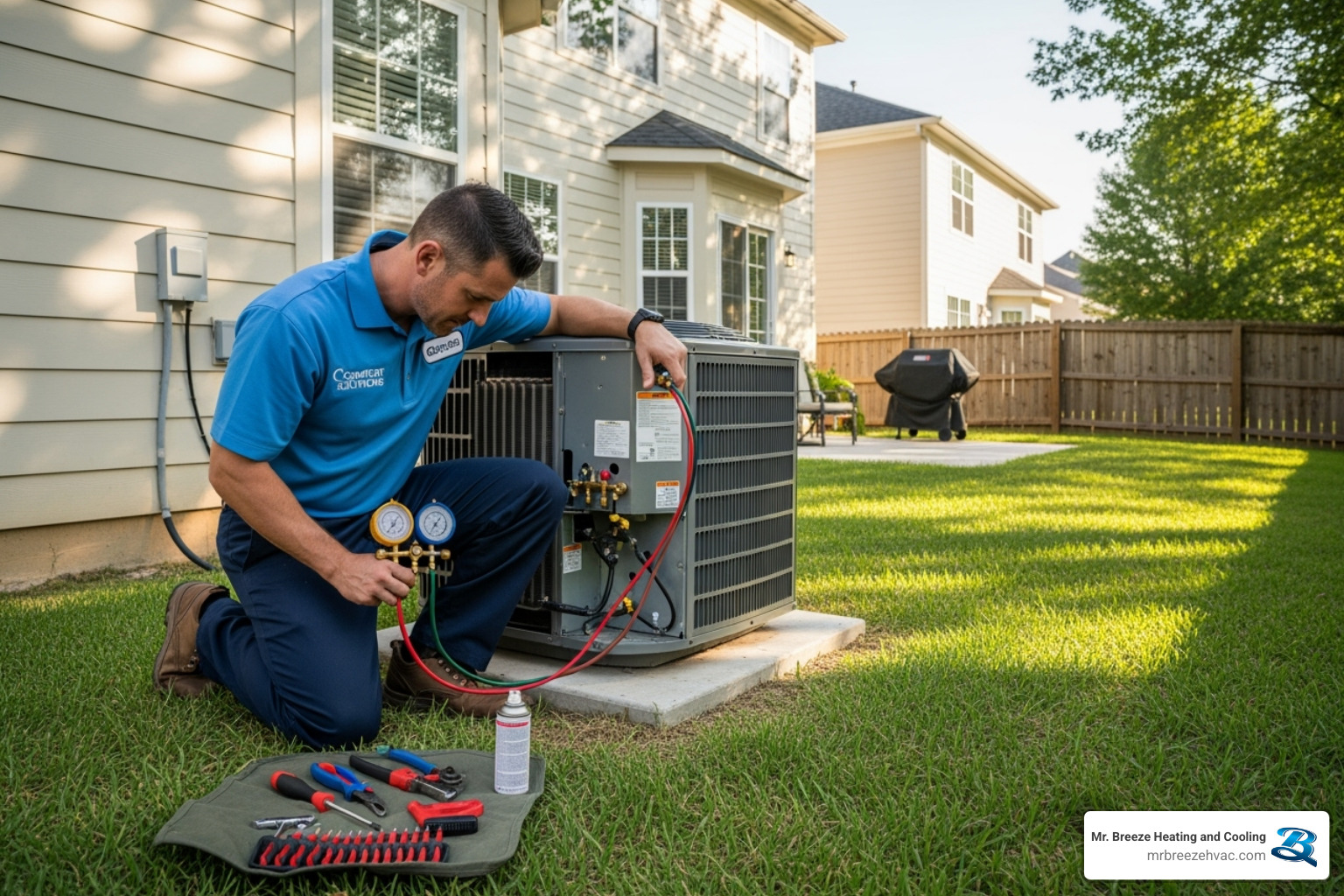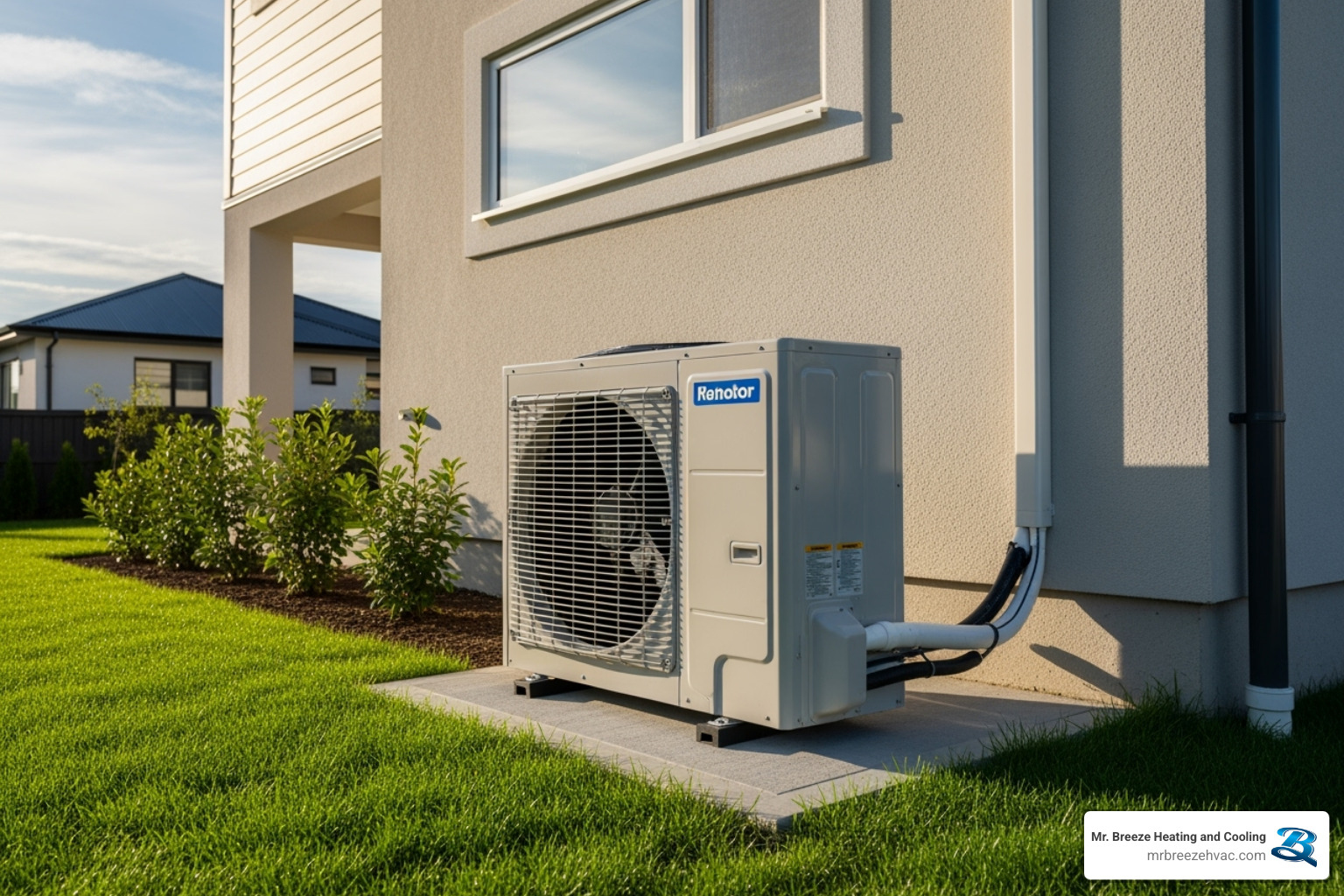Surviving the Leavenworth Heat
When your air conditioner not cooling leavenworth home becomes a crisis, you’re not alone. Leavenworth summers have gotten brutal – with temperatures hitting 114°F and heat waves lasting up to 30 days instead of the 4-7 days residents used to expect.
Quick diagnosis for AC cooling issues:
- Check thermostat – Set to “Cool” and “Auto”, temperature below current room temp
- Replace dirty air filter – Clogged filters block airflow and strain the system
- Clear outdoor unit – Remove debris within 3 feet of condenser
- Reset circuit breaker – Look for tripped AC breaker in electrical panel
- Listen for sounds – Hissing or bubbling indicates refrigerant leaks (call professional)
- Check for ice – Frozen coils mean restricted airflow or low refrigerant
The combination of extreme heat and wildfire smoke makes AC problems even worse. When smoke forces you to keep windows closed, your struggling air conditioner becomes your only defense against dangerous indoor temperatures.
One Reddit user described sleeping in a master bedroom that “never dropped below 90°F” during a heat wave. That’s not just uncomfortable – it’s dangerous for your family’s health.
Most cooling problems start simple but can lead to major issues if ignored. A dirty filter might seem minor, but it forces your system to work harder, potentially causing significant damage like compressor failure.
First Steps: Simple DIY Checks for a Struggling AC
When your air conditioner not cooling Leavenworth home properly, don’t panic just yet. Before calling for help, there are several quick checks you can do yourself that might solve the problem in minutes. These simple troubleshooting steps have saved countless homeowners from unnecessary service calls – and they’re easier than you think.
Check Your Thermostat Settings
Your thermostat might look innocent sitting on the wall, but it’s often the sneaky culprit behind cooling problems. Let’s walk through the basics that trip up even the most tech-savvy folks.
First, make sure your thermostat is set to “Cool” mode – not “Heat” or “Fan Only.” It happens more often than you’d think, especially after someone fiddles with the settings. If it’s stuck on “Fan Only,” your system will just blow air around without actually cooling it.
Next, check that your temperature setting is lower than what your home currently feels like. Try dropping it 5-10 degrees below the room temperature to see if your AC kicks on. Sometimes thermostats get confused about the actual temperature, especially if they’re in a sunny spot or near a heat source.
The fan setting makes a bigger difference than most people realize. Set it to “Auto” rather than “On.” When it’s on “Auto,” the fan only runs during cooling cycles. If it’s set to “On,” the fan blows constantly – even when the AC isn’t cooling – which just circulates warm air and makes you think nothing’s working.
Don’t forget to check the batteries if you have a battery-powered thermostat. Dead batteries can make your thermostat completely unresponsive, leaving you sweating while wondering what went wrong.
Inspect Your Air Filter
A clogged air filter is probably the most common reason an air conditioner not cooling Leavenworth homes effectively. Think of it as your AC trying to breathe through a dirty sock – not very effective.
When your filter gets packed with dust, pet hair, and all the stuff floating around your house, it restricts airflow dramatically. Your poor AC has to work overtime just to suck air through that mess, and it often can’t pull enough air to cool your home properly.
Here’s the thing – a dirty filter doesn’t just make your AC work harder. It can actually cause your system to strain so much that other parts start failing. The evaporator coil might freeze up, or worse, your compressor could overheat and die completely.
Checking and replacing your filter is surprisingly simple. Most filters slide right out of a slot near your indoor unit. Hold it up to the light – if you can’t see through it clearly, it’s time for a new one. During Leavenworth’s hot summers, check it monthly. Your AC will thank you with better cooling and improved energy efficiency.
For more detailed guidance on getting your cooling system back in fighting shape, check out our comprehensive guide on Reviving Cooling System Tips: Home AC Repair.
Examine the Outdoor Unit (Condenser)
Your outdoor unit is like the hardworking hero of your cooling system – it takes all the heat from inside your house and dumps it outside. But when it gets clogged up with debris, it’s like trying to exhale through a pillow.
Walk around your condenser and look for leaves, grass clippings, dirt, and other outdoor debris that might be blocking the airflow. Even small amounts of buildup can seriously hurt your AC’s performance. You’d be amazed how much stuff can accumulate there, especially after a storm or when you’re mowing the lawn nearby.
Landscaping clearance is crucial but often overlooked. Those pretty shrubs and bushes around your AC might look nice, but if they’re too close, they’re basically wrapping your unit in a warm blanket. Keep at least two to three feet of clear space around all sides of your condenser.
You can do some gentle cleaning of the condenser coils yourself by carefully removing visible debris from the outside fins. Just be super gentle – those fins bend easily and require professional repair if damaged. Turn off the power first, and don’t use a pressure washer or anything too aggressive.
Here’s a pro tip: while you want clearance around your unit, providing some shade from the west can actually help your AC work more efficiently. Just make sure any trees are planted at least 30 feet from your house for fire safety. For more expert advice on balancing landscaping and AC performance, check out these helpful Tips for landscaping around your AC unit.
Reset the Circuit Breaker
Sometimes your AC just gets overwhelmed by the heat and decides to take a break by tripping its circuit breaker. It’s like your electrical system saying “whoa there, let’s cool it for a minute.”
Head to your electrical panel and look for the breaker labeled something like “AC,” “Air Conditioner,” or “HVAC.” If it’s tripped, it’ll be sitting in the middle position or flipped to “off” – different from all the others that are clearly in the “on” position.
Resetting the breaker is straightforward: flip it completely to the “off” position, wait about a minute (this gives everything time to reset), then flip it back to “on.” You should hear your AC try to start up within a few minutes.
But here’s an important warning – if that breaker trips again right away, you’ve got bigger power issues that need professional attention. Don’t keep resetting a breaker that won’t stay on. That’s your electrical system trying to protect you from something potentially dangerous, so listen to it and call for help.
Why Your Air Conditioner Not Cooling in Leavenworth May Need a Pro
Sometimes the problem goes deeper than a dirty filter or tripped breaker. When your air conditioner not cooling Leavenworth home involves complex mechanical issues, it’s time to call in the experts. These aren’t problems you can fix with a YouTube tutorial – they require specialized tools, expertise, and safety knowledge that only licensed HVAC professionals possess.
Attempting DIY repairs on these issues can actually make things worse, leading to more complex problems. Plus, working with refrigerants and electrical components can be downright dangerous without proper equipment and experience.
Signs of a Refrigerant Leak
Your AC’s refrigerant is like the blood in your veins – without enough of it, the whole system breaks down. Unlike your car’s oil, refrigerant doesn’t just “run low” over time. If levels are down, there’s definitely a leak somewhere.
Hissing or bubbling sounds from your refrigerant lines are your AC crying for help. That’s the sound of refrigerant escaping or air sneaking into the system where it doesn’t belong. You might hear these sounds near the outdoor unit or along the copper lines connecting your indoor and outdoor components.
Ice formation on refrigerant lines is another dead giveaway. When refrigerant leaks out, the pressure drops dramatically, causing the remaining refrigerant to get extremely cold. You’ll typically see ice on the larger, insulated copper line heading into your outdoor unit.
The most frustrating symptom? Your air conditioner not cooling Leavenworth property effectively despite running constantly. The system works overtime trying to compensate for the missing refrigerant, but it’s like trying to cool your house with half a system.
Here’s the serious part: refrigerant leaks pose health and environmental risks. Modern refrigerants can displace oxygen in enclosed spaces, and older systems may contain substances that damage the ozone layer. This is definitely professional territory. For more insight into cooling problems, check out our guide on Common Causes for AC Units Not Cooling Properly.
Electrical and Mechanical Failures
Modern air conditioners are sophisticated machines with dozens of electrical and mechanical components working in harmony. When one key player fails, the whole orchestra falls apart.
Faulty capacitors are like the starter motor in your car. These electrical components provide the initial power surge needed to kick-start your compressor and fan motors. When a capacitor goes bad, you might hear your unit humming or struggling to start, but it won’t actually fire up. Some units will start but then shut down unexpectedly.
Worn contactors act as electrical switches that control power to your compressor and outdoor fan. Over time, these contacts can become pitted or corroded, preventing proper electrical connection. Your thermostat might be calling for cooling, but the message never reaches the outdoor unit.
The compressor is your AC’s heart, circulating refrigerant throughout the system. When it fails, cooling stops completely. Compressor problems often develop gradually – you might notice your system struggling to keep up on hot days before it gives up entirely.
Fan motor problems affect air circulation both inside and outside your home. The indoor blower motor pushes cool air through your ducts, while the outdoor fan motor helps expel heat from the condenser. Strange noises like grinding, squealing, or rattling often signal motor trouble or worn bearings.
These components require diagnostic equipment and technical expertise to repair safely. Electrical work around high-voltage AC systems isn’t a DIY project. Learn more about recognizing these issues in our article on Signs Your Home AC Needs Professional Attention.
Frozen Evaporator Coils
While ice on outdoor lines usually means refrigerant leaks, ice buildup on your indoor evaporator coils creates a different kind of cooling crisis. It’s like your AC’s lungs being frozen shut – no air can pass through to get cooled.
Ice buildup inside your indoor unit turns your evaporator coil into a block of ice instead of a heat-absorbing surface. You’ll get weak airflow and warm air from your vents, even though you can hear the system running. Sometimes you’ll notice water dripping from your indoor unit as the ice melts.
The causes are usually dirty filters that restrict airflow or low refrigerant that makes the coil too cold. When warm air can’t flow properly over the evaporator coil, the coil temperature drops below freezing. Moisture in the air then freezes on contact, building up layers of ice.
Thawing the unit requires patience, not force. Turn off your AC immediately and switch the fan to “On” if possible to help melt the ice naturally. Never try to chip or scrape ice off the coils – those delicate fins damage easily and require professional replacement.
Once thawed, you need professional diagnosis to prevent it from happening again. The underlying cause – whether it’s airflow restriction, refrigerant leaks, or other mechanical issues – requires expert attention to fix properly.
Leavenworth’s Climate: How Heat and Smoke Challenge Your AC
When you’re dealing with an air conditioner not cooling Leavenworth home, you’re fighting against some pretty tough odds. Our beautiful Kansas summers have become increasingly brutal, and frankly, they’re testing every cooling system to its limits.
Battling Extreme Heat and Wildfire Smoke
Remember when a typical Leavenworth heat wave lasted maybe a week? Those days are behind us. We’re now seeing heat waves stretch for 30 days or more, with temperatures that would make a desert dweller sweat. When the mercury hit 114°F in 2021, it wasn’t just uncomfortable – it was dangerous.
During these marathon heat events, your AC running constantly isn’t a malfunction – it’s survival mode. When outdoor temperatures soar above 80°F, it’s completely normal for your system to work around the clock just to keep your home livable. Think of it like asking someone to carry groceries up three flights of stairs – doable once, exhausting when repeated all day long.
But here’s where things get really challenging: wildfire smoke. When that thick, acrid haze rolls into Leavenworth, opening windows for natural cooling becomes impossible. You’re essentially trapped indoors, completely dependent on your AC system not just for comfort, but for breathable air.
Keeping windows and doors tightly sealed during these episodes is crucial. Every gap lets in hot, smoky air that your poor AC has to work even harder to cool and filter. It’s like trying to fill a bucket with holes in it – your system fights a losing battle against infiltration.
This is exactly why regular maintenance matters so much. A well-tuned system handles these extreme conditions far better than one that’s already struggling. Check out our guide on Why Regular AC Tune-Ups Matter for Summer to learn how preparation makes all the difference.
Is a Heat Pump a Better Choice for Leavenworth?
Given what we’re up against climatewise, many Leavenworth homeowners are asking if there’s a better way to stay comfortable year-round. Heat pumps are becoming an increasingly smart choice for our area, and here’s why they might make sense for your home.
Unlike traditional air conditioners that only cool, heat pumps work double duty – cooling your home in summer and heating it in winter. They’re essentially heat movers, pulling warmth out of your house when it’s hot and bringing it in when it’s cold. One system, two jobs, and often better efficiency than running separate heating and cooling equipment.
The efficiency factor is huge in our climate. Heat pumps excel in areas like ours where we don’t face months of sub-zero temperatures. They can dramatically reduce your energy consumption compared to traditional systems, which improves energy efficiency and puts less strain on the electrical grid during peak demand.
But here’s something many people don’t consider: superior air filtration. Modern heat pump systems often come equipped with advanced filtration capabilities that can be a game-changer when wildfire smoke rolls through town. Better air quality isn’t just about comfort – it’s about health.
Heat Pump Benefits:
- Provides both heating and cooling in one efficient system
- Delivers high energy efficiency, reducing energy consumption
- Maintains consistent comfort throughout changing seasons
- Often includes advanced air filtration for cleaner indoor air
- Offers a more environmentally conscious cooling and heating solution
The bottom line? Leavenworth’s evolving climate demands reliable, efficient cooling solutions. Whether you’re troubleshooting your current system or considering an upgrade, understanding how our local conditions affect your home’s comfort helps you make smarter decisions about keeping your family safe and comfortable.
Repair or Replace? Making the Right Call for Your AC
When your air conditioner not cooling Leavenworth home effectively becomes a recurring nightmare, you’re facing one of homeownership’s toughest decisions. Should you continue with repairs, or is it time to replace the whole system? We get it – it’s a major decision either way, but making the right choice now can prevent future headaches.
The truth is, there comes a point where even the most reliable AC unit starts telling you it’s ready to retire. The question is: are you listening?
The 10-15 Year Rule for AC Units
Here’s a reality check: your AC wasn’t designed to last forever. Most residential air conditioning systems have a lifespan of 10-15 years, and once they hit that milestone, they start showing their age with declining performance and reliability.
Think about it this way – if your AC is approaching its teenage years, it’s probably getting a bit rebellious. Efficiency starts declining as internal components wear down, seals deteriorate, and that once-smooth operation becomes more like a tired old engine struggling uphill. Its energy consumption starts creeping up because your system has to work twice as hard to deliver half the comfort.
Furthermore, if your unit was manufactured before 2010, it likely uses R-22 refrigerant, which is being phased out for environmental reasons. Finding R-22 for repairs is like hunting for dinosaur bones – possible, but increasingly rare and difficult to source. When your older system springs a refrigerant leak, finding the right refrigerant can be a significant challenge.
The smart move? Start planning for replacement before you’re stuck in the middle of a heat wave with a dead system and limited options. Our guide on When to Schedule an AC Replacement for Home can help you time this decision perfectly.
When Repair Isn’t Enough for an Air Conditioner Not Cooling in Leavenworth
Sometimes your AC becomes a source of constant problems – always needing attention and draining your patience. When service calls become a regular occurrence, it’s time to have an honest conversation about replacement.
Frequent breakdowns are your AC’s way of waving a white flag. If you’re calling for service multiple times each summer, or if your technician knows your address by heart, your system is telling you it’s tired of fighting the good fight. While individual repairs might solve immediate problems, the cumulative effect of frequent service calls can be a sign that the system is failing.
If you’re facing a major, complex repair, it’s often wise to weigh that against the benefits of a new system. You’ll get a fresh warranty, modern efficiency, and the peace of mind that comes with knowing your AC isn’t plotting its next breakdown.
A noticeable increase in energy consumption is another red flag that’s easy to miss. If your system seems to be using much more power than it used to, your aging AC is probably the culprit. Older systems lose efficiency gradually, so you might not notice the creep until you compare this year’s performance to what you remember from three summers ago.
The final straw? When your air conditioner not cooling Leavenworth home becomes an annual summer crisis instead of a rare inconvenience. If you’re already dreading the next heat wave because you know your AC might not make it through, that’s your cue to start shopping for a replacement.
Ready to explore your options? Check out our comprehensive guide on Signs Your Home Needs a New AC Installation to help you make this important decision with confidence.
Your Local Solution for a Cool and Comfortable Home
When your air conditioner not cooling Leavenworth home leaves you sweltering in 114°F heat, it’s time to call in the experts. You’ve checked the thermostat, replaced the filter, and cleared debris from your outdoor unit – but sometimes the problem runs deeper than what meets the eye.
The truth is, after performing those basic checks we covered earlier, the safest and most effective solution for complex issues like refrigerant leaks or electrical failures is professional service. These aren’t DIY territory, and attempting to fix them yourself can be dangerous or cause more significant damage.
A trusted technician brings the right tools and expertise to accurately diagnose what’s really wrong with your system. They can spot problems you might miss – like a failing capacitor that’s about to leave you without cooling during the next heat wave, or a refrigerant leak that’s slowly poisoning your system’s performance.
When wildfire smoke blankets our area and temperatures soar past 100°F, you need your AC working now, not after days of guessing games. Professional diagnosis means faster solutions and restored comfort when you need it most.
For over 40 years, Mr. Breeze Heating and Cooling has been the trusted name for honest, high-quality air conditioning services throughout Leavenworth and the surrounding areas. We understand the unique challenges our climate throws at your cooling system – from those brutal 30-day heat waves to the smoky air that keeps your windows sealed shut.
We’re here to solve your AC mystery and bring cool comfort back to your home, whether that means a quick repair or helping you decide if it’s time for a replacement. Because when Leavenworth turns into an oven, your family deserves better than hoping your AC will magically start working again.


